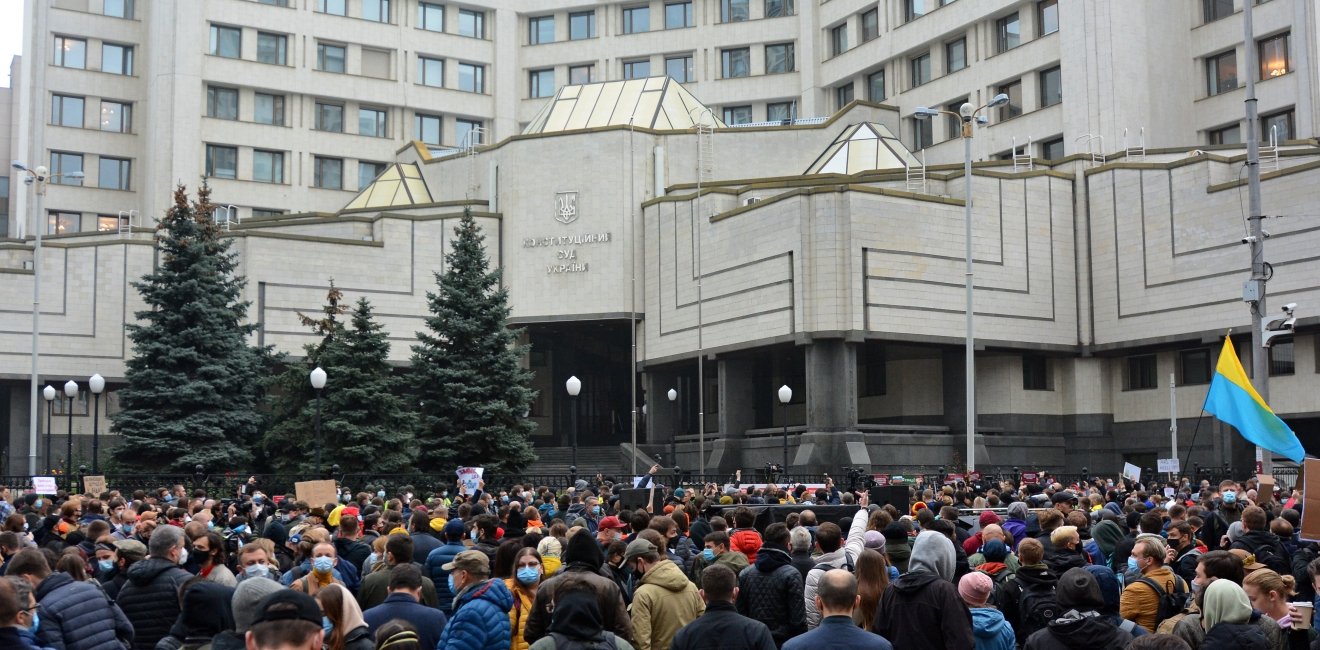
A blog of the Kennan Institute
BY NINA JANKOWICZ
In 2019, entertainer-turned-presidential-candidate Volodymyr Zelensky had few policy positions. The Ukrainian public had little idea how he would counter Russian aggression, improve the country’s economy, or crack down on corruption. But Zelensky, who would go on to defeat incumbent Petro Poroshenko in a landslide victory, did have clear opinions about fighting Russian disinformation and propaganda. In an interview with the Russian news outlet RBK, Zelensky described Poroshenko-era bans on Russian social media networks and websites deemed “national security threats” as ineffective. Ukrainians were finding ways around the bans, he said, and the Poroshenko government had never explained why it made these decisions in the first place. It seemed unlikely that the future Zelensky administration would uphold the measures.
Almost two years later, President Zelensky and his National Security and Defense Council did an about-face, banning three pro-Russian television channels—112, NewsOne, and Zik, all connected to pro-Putin oligarch Viktor Medvedchuk—and sanctioned their Ukrainian owner, Taras Kozak. “About yesterday’s sanctions,” wrote Zelensky in the caption to a roguish Instagram photo featuring him in a bulletproof vest, somewhere near the front lines of the war in the Donbas, “Now I hope that fakes and hybrid propaganda will truly decrease.”
I often refer to Ukraine as the “front lines” of Russia’s information war, and for good reason: Ukraine has long been a proving ground for Russian information operations. But these operations look a bit different than they used to: as social media platforms have cracked down on foreign campaigns on their services and users have become savvier, disinformers in Ukraine and elsewhere have turned away from the internet and attempted to launder their messages through the mainstream media, complicating the fight against disinformation. Unlike the removal of fake accounts on private social media platforms, however, government action by political bodies against media outlets raises worrisome questions, whether in Ukraine or beyond.
Some Ukrainians have been clamoring for this move for years. Insofar as most Ukrainians—74 percent in 2018—get their news from TV, popular channels that legitimize pro-Russian narratives certainly contribute to the laundering of Russian disinformation in Ukraine. During the 2019 presidential election, most Ukrainians I interviewed recognized the insidiousness of domestic disinformation. Dmytro Razumkov, an influential pollster and Zelensky advisor who has since assumed the role of chairman of Ukraine’s Verkhovna Rada, told me on Election night in 2019 that Ukraine was dealing with disinformation on two fronts, domestic and foreign, and yet it lacked a strategy for how to deal with informational threats on both fronts: “I'm not talking about restrictions on citizens' freedom of speech, I'm not talking under any circumstances about restrictions on journalism, but a united, understandable and transparent rules of the game, and in opposition to Russia as an informational aggressor—this is really important.”
Outside the Zelensky camp, Ivana Klympush-Tsintsadze, who in 2019 was vice prime minister for Euro-Atlantic integration, discussed expanding Poroshenko-era bans to potentially include television stations, especially those with opaque ownership structures, such as 112, NewsOne, and Zik. “If you ... see that a TV station is basically producing content that is harmful to the security [and] national interests of the country” and attempt to take action against it, she told me, “you would be immediately accused of fighting freedom of speech.”
As under the Poroshenko administration, the context of the decision and its repercussions for freedom of speech are worrying. Though Zelensky’s presidential campaign was shockingly accessible to journalists, after he assumed office the administration quickly shifted to an adversarial, highly managed relationship with the press, for which the team has been criticized. Early last year, Zelensky’s culture minister was hard at work on draft regulations to counter disinformation; freedom of expression advocates noted those regulations would have restricted press access and further politicized the information environment with the presidential appointment of an information commissioner. (The project was tabled as the coronavirus took hold.) And now, far from his original position of reopening Ukraine’s information environment, Zelensky is banning outlets with the stroke of a pen.
Ukrainians themselves are divided about Zelensky’s decision. In a Kyiv International Institute of Sociology poll, 34.6 percent of respondents described the measure as a “necessary step to protect the country,” while 40.8 percent called it a “mistake that only limits the rights of citizens.” (Another 24.6 percent did not or could not answer.)
An outright ban on adversarial propaganda networks is not a move that the United States or its European allies would consider. Rather than banning networks like RT and Sputnik, the United States has instead labeled them “foreign agents” and required specific disclosures of them under the Foreign Agents Registration Act. In the United Kingdom, the government communications regulator, the Office of Communications (OfCom), has levied fines against RT for “serious and repeated failures of compliance” with the body’s rules on “due impartiality.”
Ukrainians who support measures like Zelensky’s sanctions and Poroshenko’s ban on Russian social media platforms are quick to point out that there is more at stake in the Ukrainian information environment than in its American or British analogs. As Klympush-Tsintsadze told me in 2019, “Don’t forget that we are a country at war. We are losing people every other day, if not every single day.” Ukraine believes it must protect its information space to the same degree that it has defended its physical territory.
But in a country with a notoriously personalized media environment that often operates as a proxy for elites’ political battles, the lure of shuttering adversarial media outlets under the guise of national security and “fighting fake news” may be too great for some leaders to resist. Zelensky and his government would do well to limit these executive powers for whoever might succeed him, and perhaps return to his original instincts from the campaign trail about a public consultative process: “In any decision, it is necessary to unite society, explain why,” he told RBK in reference to the Russian social media bans. “Propose a model, and then [make the decision]. Only in this way.”
The opinions expressed in this article are those solely of the authors and do not reflect the views of the Kennan Institute.
Author

Founder, Sophias Strategies LLC; Former Fulbright-Clinton Public Policy Fellow

Kennan Institute
After more than 50 years as a vital part of the Wilson Center legacy, the Kennan Institute has become an independent think tank. You can find the current website for the Kennan Institute at kennaninstitute.org. Please look for future announcements about partnership activities between the Wilson Center and the Kennan Institute at Wilson Center Press Room. The Wilson Center is proud of its historic connection to the Kennan Institute and looks forward to supporting its activities as an independent center of knowledge. The Kennan Institute is committed to improving American understanding of Russia, Ukraine, Central Asia, the South Caucasus, and the surrounding region through research and exchange. Read more

Explore More in Focus Ukraine
Browse Focus Ukraine
Talking to the Dead to Heal the Living

Ukrainian Issue in Polish Elections


